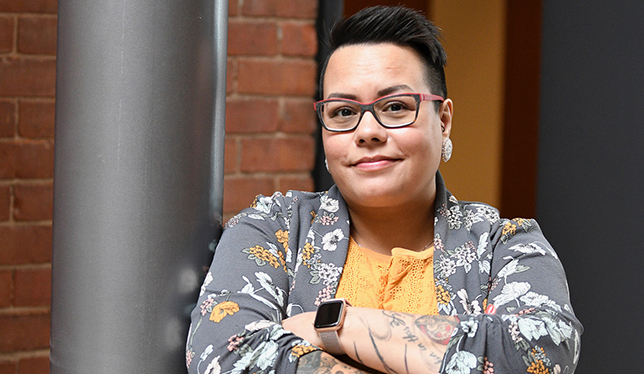A program at Queen’s University’s faculty of arts and science is addressing the need for Indigenous scholars in faculty positions at Canadian universities.
Queen’s launched its Pre-doctoral Fellowship Program for Indigenous students in 2018, reportedly the first of its kind in Canada, as a way to advance Indigenous scholarship and the indigenization of curricula, while providing financial support and mentorship to Indigenous scholars in the final stages of their doctoral work.
“It came about through my work with an Indigenous graduate student of mine who did a pre-doctoral fellowship in the States,” says Lynda Jessup, associate dean of graduate studies in the faculty of arts and science. Dr. Jessup says that her student found the fellowship formative and pitched a similar program for Queen’s.
Much like a postdoctoral fellowship, the Queen’s program provides financial support through a $34,000-stipend and teaching wages for Indigenous fellows who come to Queen’s from other Canadian universities. The fellows come from any field within arts and sciences, and are paired with a faculty mentor. The fellowship lasts for one year, during which participants are expected to complete their doctoral project while engaging with the local community and teaching a one-term course in their area of research.
“Everybody is looking for Indigenous faculty and scholars to be contributing to the academy. And there’s a very limited amount of people available to fill those roles,” says Kanonhsyonne (Janice Hill), associate vice-principal of Indigenous initiatives and reconciliation at Queen’s.
The need is so great, Dr. Jessup says, that Indigenous faculty positions are being filled by individuals who are still in the process of finishing their doctoral degrees.
“This means that they’re taking on a faculty position, they’re teaching and they’re supposed to be establishing their research agenda going forward when they haven’t [yet] finished their degree. And, so, it really puts them at a disadvantage,” Dr. Jessup says.
The pre-doctoral fellowship addresses this issue by giving Indigenous students the chance to finish their projects while also contributing to the university. The experience paired with the completed degree should give them a leg up when it comes to applying for faculty positions after graduation – particularly at Queen’s.
“If we can’t attract faculty members to come to Queen’s, then maybe we grow our own,” Ms. Hill says.
The first year of the program had five fellows, while there are three for the 2019-2020 academic year. Already one of the inaugural fellows, Scott Berthelette, has taken a tenure-track position in the Queen’s history department following his successful dissertation defense.
Keri Cheechoo, a Cree Iskwew (woman) from Long Lake #58 First Nation, was also one of the inaugural fellows in 2018. She successfully defended her dissertation at the University of Ottawa this past December and was recently hired as an assistant professor with U of Ottawa’s faculty of education. Her research covers the history of the state-sponsored policy of forcing sterilization on Indigenous women in Canada.

“I was elated that I was accepted because I knew it was prestigious,” Cheechoo says. “I was really happy to be making community relationships and relationships with other Indigenous scholars.”
Dr. Cheechoo says that while there were benefits to being part of the pre-doctoral fellowship program, her expectations about the opportunities for sharing knowledge didn’t completely play out.
“I wish that the experience had been different [so] that I could have really engaged my own Indigenous knowledge in a way that really created these spaces of relational pedagogy. I really wanted to be able to have a conversation and [have] what I was saying taken seriously.”
Dr. Cheechoo says she wished there had been protocols in place to allow for more room for the fellows to share their expertise and personal experience, and that the inaugural fellows could have contributed more as team to the university community.
“I wanted to be able to bring that dream team out into the university,” Dr. Cheechoo says. “[I wanted to] create these pockets where we were educating and sharing our knowledge together, and it didn’t really play out like that.”
As the program looks toward its third year, the faculty of arts and science is working with its current Indigenous fellows to see what is going well and what could be better. And Dr. Jessup says she’s heard from other universities who are interested in starting similar programs of their own.
“This pre-doctoral fellowship is a great concept,” says Dr. Cheechoo. “I think in the future, with true teamwork and working with the Indigenous scholars … and the Indigenous community that’s already present at the university, the program will only flourish and get better.”